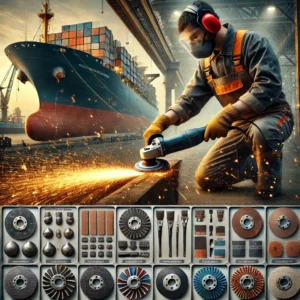Introduction to Online Trading of Moku.com
On May 20, 2022, Moku.com online trading project was officially launched. Transfer the transaction of grinding enterprises from offline to

Source: Abrasivestocks Grinding Hub
Ships endure relentless exposure to harsh marine environments, making them susceptible to corrosion, dirt, and degradation from salt, water, and wind.
Polishing is an essential process for maintaining these vessels, involving the removal of rust, oxides, and old paint layers. This surface treatment enhances subsequent operations like welding, painting, and repairs, while also improving aesthetics, boosting corrosion resistance, and prolonging the vessel’s operational life.
At ABRASIVESTOCKS, we provide a wide range of abrasive products for cutting, sandblasting, grinding, and polishing applications. Visit our website at www.abrasivestocks.com to explore products tailored to meet your needs.
Why is Polishing Crucial for Ships?
Key Benefits:
Enhances surface smoothness.
Prevents corrosion and promotes adhesion of coatings.
Critical Polishing Areas:
Hulls, decks, weld seams, and propellers.
Challenges in Marine Polishing:
High humidity and large surface areas.
Diverse materials requiring tools that balance efficiency and durability.
The polishing process relies on friction between abrasive particles and the surface material. In ship maintenance, it demands precision, efficiency, and a damage-free approach. Choosing the right tools and mastering proper techniques are vital for achieving the best results.
Selecting the Right Abrasive Tools for Different Materials
The shipbuilding and maintenance industry employs various abrasive tools, including grinding wheels, belts, fiber discs, resin sanding discs, and polishing sponges. Among these, grinding wheels and belts dominate due to their durability and efficiency, making them the preferred choice for hull polishing and weld seam finishing.
Material-Specific Recommendations:
Steel
Recommended Tools: Resin-bonded metal cutting wheels paired with angle grinders.
Why: Steel’s hardness requires durable tools like aluminum oxide wheels for effective rust removal.
Result: Uniform, rust-free surfaces ready for painting.
Aluminum Alloys
Recommended Tools: Zirconia alumina belts, nonwoven abrasives, silicon carbide discs.
Why: Aluminum’s softness demands low-heat grinding to avoid deformation. Zirconia alumina offers self-sharpening efficiency.
Result: Smooth, scratch-free surfaces.
Fiberglass
Recommended Tools: Precision grinding discs, silicon carbide sandpaper.
Why: Fiberglass’s brittleness requires flexible tools for fine polishing.
Result: Smooth edges and crack-free surfaces.
With ABRASIVESTOCKS, you can find all the above-mentioned abrasive products designed to deliver efficiency and precision across different ship materials.
Step-by-Step Guide to Ship Polishing
Preparation Stage
Clean the Surface: Remove oil, rust, and debris.
Select the Right Tool: Match tools to the material and desired finish.
Safety First: Wear protective gear and inspect equipment for functionality.
Polishing Process
Coarse Grinding: Use low-grit wheels or belts to strip rust and old paint.
Fine Polishing: Switch to high-grit tools or polishing pads for surface finishing.
Inspection: Regularly check progress to prevent over-grinding.
Post-Polishing Treatment
Clean the Area: Use compressed air or brushes to remove residual dust.
Apply Protection: Use anti-corrosion primers or protective coatings.
Avoiding Common Polishing Mistakes
Frequent Errors:
Incorrect Tool Selection: Inefficient results or surface damage.
Excessive Force: Accelerates tool wear and damages surfaces.
Neglecting Cooling Measures: Overheating can deform or degrade materials.
Efficient Techniques:
Maintain a stable tool angle to prevent bouncing.
Adjust tool speed based on material to minimize heat buildup.
Regularly clean tools to maintain performance.
Extending Tool Lifespan
Proper Use: Avoid overloading and adhere to rated speeds. Replace tools as needed.
Storage and Maintenance: Store tools in a dry, ventilated area to prevent moisture damage.
Cleaning and Dressing: Use brushes for cleaning and dress grinding tools to restore their shape and efficiency.
Conclusion
Ship polishing is a demanding but rewarding process that significantly enhances vessel performance and longevity. By selecting the right tools, following effective procedures, and maintaining equipment, you can achieve exceptional results while ensuring the vessel’s safety and durability.
ABRASIVESTOCKS offers a comprehensive selection of abrasive products to meet your polishing, grinding, and cutting needs. Whether for ship maintenance or other industrial applications, our products are designed for quality and efficiency. Visit us at www.abrasivestocks.com.au to find the tools that work best for you.
Share Your Experience:
Have you used abrasive tools for ship maintenance? Let us know your tips and insights in the comments or connect with us on LinkedIn!
On May 20, 2022, Moku.com online trading project was officially launched. Transfer the transaction of grinding enterprises from offline to
–The Fourth Phase of Abrasive and Abrasive Tools Training Program of Materials School of Henan University of Technology Successfully Concluded
MK ONLINE TRADING May 20 Moku Online Transaction Officially Launched Yang Heng, CEO of Moku.com, said that the online